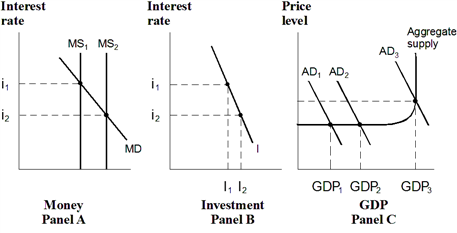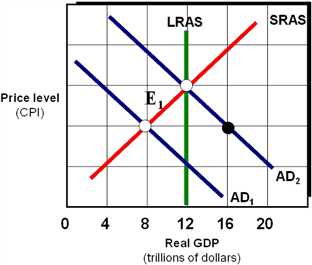Exam 20: Policy Disputes Using the Self-Correcting Aggregate Demand and Supply Model
Exam 1: Introducing the Economic Way of Thinking254 Questions
Exam 2: Production Possibilities, Opportunity Cost, and Economic Growth209 Questions
Exam 3: Market Demand and Supply361 Questions
Exam 4: Markets in Action259 Questions
Exam 5: Price Elasticity of Demand181 Questions
Exam 6: Production Costs254 Questions
Exam 7: Perfect Competition226 Questions
Exam 8: Monopoly175 Questions
Exam 9: Monopolistic Competition and Oligopoly166 Questions
Exam 10: Labor Markets and Income Distribution185 Questions
Exam 11: Gross Domestic Product207 Questions
Exam 12: Business Cycles and Unemployment199 Questions
Exam 13: Inflation131 Questions
Exam 14: Aggregate Demand and Supply83 Questions
Exam 15: Fiscal Policy205 Questions
Exam 16: The Public Sector131 Questions
Exam 17: Federal Deficits, Surpluses, and the National Debt102 Questions
Exam 18: Money and the Federal Reserve System159 Questions
Exam 19: Money Creation250 Questions
Exam 20: Policy Disputes Using the Self-Correcting Aggregate Demand and Supply Model246 Questions
Exam 21: International Trade and Finance251 Questions
Exam 22: Economies in Transition108 Questions
Exam 23: Growth and the Less-Developed Countries121 Questions
Select questions type
Other things being equal, an increase in the rate of interest causes a(n):
Free
(Multiple Choice)
4.9/5  (45)
(45)
Correct Answer:
A
Monetarists argue that fiscal policy is ineffective because:
Free
(Multiple Choice)
4.7/5  (30)
(30)
Correct Answer:
B
When there is an excess demand for money, individuals and businesses will attempt to purchase bonds.
Free
(True/False)
4.8/5  (30)
(30)
Correct Answer:
False
According to the quantity theory of money, which one of the following economic variables would change in response to an increase in the money supply?
(Multiple Choice)
4.7/5  (40)
(40)
Assume the economy is in short-run equilibrium at a real GDP below its potential real GDP. According to Keynesian theory, which of the following policies should be followed?
(Multiple Choice)
4.8/5  (39)
(39)
The quantity theory of money of the Classical economists says that a change in the money supply will produce a:
(Multiple Choice)
5.0/5  (31)
(31)
Keynesian economists believe monetary policy is more effective than fiscal policy in stabilizing the business cycle.
(True/False)
4.9/5  (35)
(35)
Keynes called the money people hold in order to pay unforeseen or unexpected expenses the:
(Multiple Choice)
4.9/5  (38)
(38)
Which of the following is a reason for the Keynesian view that monetary policy plays a minor role in affecting the economy?
(Multiple Choice)
4.9/5  (29)
(29)
According to Keynesians, an increase in the money supply will:
(Multiple Choice)
4.9/5  (30)
(30)
The precautionary demand for money is the demand for money:
(Multiple Choice)
4.7/5  (26)
(26)
Exhibit 20-6 Money, investment and product markets  In Exhibit 20-6, if the Fed believes the economy is at AD3, how might it engineer a decline in the price level?
In Exhibit 20-6, if the Fed believes the economy is at AD3, how might it engineer a decline in the price level?
(Multiple Choice)
4.8/5  (42)
(42)
When people hold money to transact purchases they expect to make, this is known as the:
(Multiple Choice)
4.9/5  (35)
(35)
The stock of money people hold to pay everyday predictable expenses is the:
(Multiple Choice)
4.7/5  (35)
(35)
Exhibit 20A-4 Macro AD/AS Model  As shown in Exhibit 20A-4, assume the marginal propensity to consume MPC equals 0.75. Using discretionary fiscal policy, federal government spending should be ____ in order to restore the economy from E1 to full employment.
As shown in Exhibit 20A-4, assume the marginal propensity to consume MPC equals 0.75. Using discretionary fiscal policy, federal government spending should be ____ in order to restore the economy from E1 to full employment.
(Multiple Choice)
4.7/5  (38)
(38)
If the economy is experiencing an inflationary gap, classical economists argue that the Federal Reserve should lower interest rates.
(True/False)
4.9/5  (28)
(28)
The transmission mechanism is the effect of changes in monetary policy on the stock market.
(True/False)
4.7/5  (32)
(32)
Monetarists reject using discretionary monetary policy as an effective stabilization tool because they believe:
(Multiple Choice)
4.8/5  (37)
(37)
Monetarists accept the idea that velocity is not constant; nonetheless, they believe that it is still highly:
(Multiple Choice)
4.9/5  (38)
(38)
Showing 1 - 20 of 246
Filters
- Essay(0)
- Multiple Choice(0)
- Short Answer(0)
- True False(0)
- Matching(0)